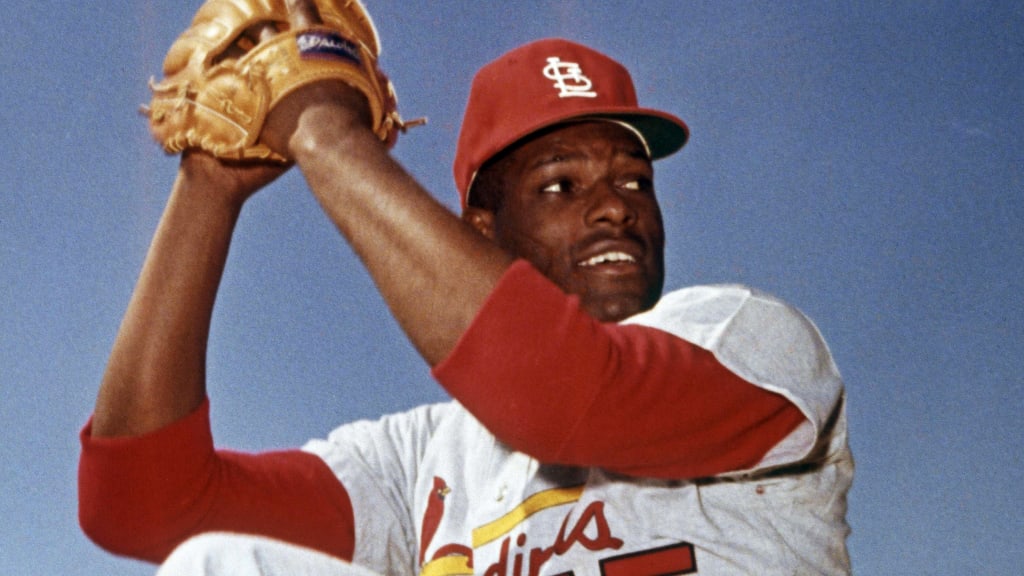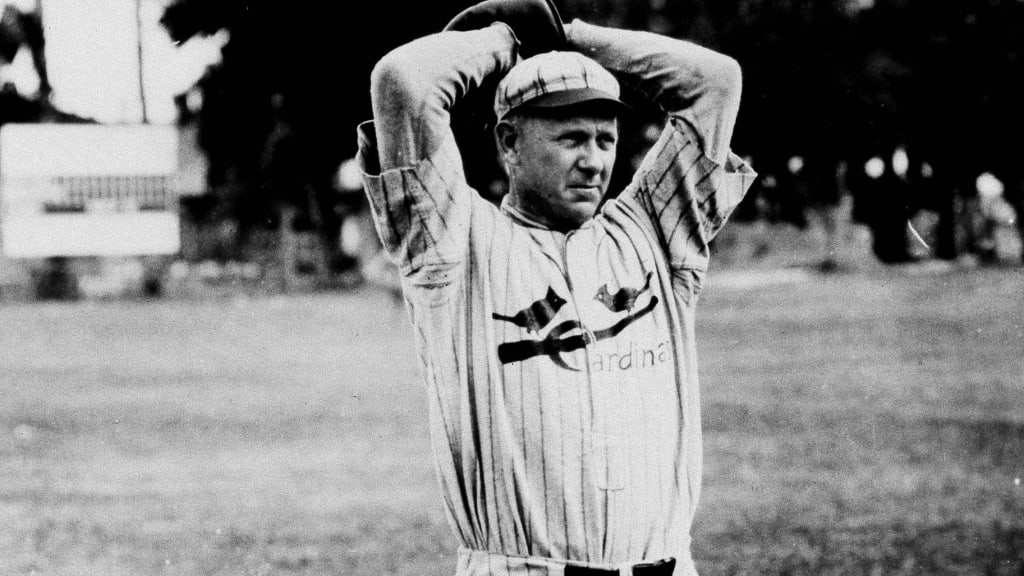
No one loves a good debate quite like baseball fans, and with that in mind, we asked each of our beat reporters to rank the Top 5 players by position in the history of their franchise, based on their career while playing for that club.
1) Bob Gibson, 1959-75
Key fact: Ranks first in Cardinals history in wins (251), complete games (255), shutouts (56), innings pitched (3,884 1/3) and strikeouts (3,117), and his 81.7 WAR is fourth all-time in club history
There are two things that put Bob Gibson at the top of this list -- and on any list ranking the best pitchers of all time. The stats, of course, that go along with his career, but also the competitiveness that shaped his reputation. Few pitchers in the history of the game intimidated like Gibson, with a low-slung cap and glaring eyes paired with a vicious slider and fierce fastball.
"It was said that I threw basically five pitches -- fastball, slider, curve, changeup and knockdown," Gibson wrote in his autobiography. "I don't believe that assessment did me justice, though. I actually used about nine pitches -- two different fastballs, two sliders, a curve, a changeup, knockdown, brushback and hit-batsman."
Gibson shut out Cincinnati in his first big league start, in 1959, but it wasn't until '61 that manager Johnny Keane made him a full-time starter. Three years later, Gibson was one of the most feared pitchers in the game. He had five 20-win seasons in a 17-year career that included two Cy Young Awards, an MVP and a no-hitter against the Pirates in 1971. The first-ballot Hall of Famer also won nine Gold Glove Awards and was a nine-time All-Star. He led the National League in strikeouts just once in his career, but he had nine seasons with at least 200 K's. In 1974, he surpassed 3,000 strikeouts and retired with 3,117.
The '68 season is remembered as Gibson's best: His 1.12 ERA was the lowest of the era, and his 13 shutouts were the most since Grover Alexander's 16 in 1916. That season was so dominant that Major League Baseball lowered the mound from 15 to 10 inches.
There are many accomplishments to Gibson's name, but the most stunning -- besides the record-shattering 1.12 ERA in '68 -- might be his complete-game total. Gibson won 251 games. He completed 255 games.
Perhaps his most dominant accomplishment was his postseason performance. In nine World Series games, Gibson won seven, pitched eight complete games and had a 1.89 ERA. The numbers that made him an October legend also made him a two-time World Series MVP.
2) Dizzy Dean, 1930, 1932-37
Key fact: The 1934 NL MVP won 30 games that year, the first National Leaguer to reach that many victories since 1917 and the last to do it in the NL
A charismatic pitcher who backed up all of his talk with talent, Dizzy Dean was arguably the best pitcher of his era. Simply put, Jay Hanna "Dizzy" Dean dazzled on the mound. He won 134 games for the Cardinals and finished in the top two in NL MVP voting for three consecutive years, winning the award in 1934. The leader of the Gashouse Gang, Dean was the winner of two games for the Cardinals in their '34 World Series win against the Tigers. He finished that season 30-7 with a 2.66 ERA and 195 strikeouts.
From 1932-36, Dean won 120 games and had a 3.04 ERA. With a fiery fastball and a sweeping curveball, he averaged 306 innings and 194 strikeouts for those five seasons. Dean led the NL in innings three times and the Majors twice, along with leading the Majors in wins twice and strikeouts four times.
Dean's 39.9 WAR, according to Baseball-Reference, ranks second all-time among Cardinals pitchers. His .641 winning percentage ranks fourth (second among right-handers) in franchise history, and his 1,095 strikeouts rank third.
Had a line drive in the 1937 All-Star Game not fractured one of his toes, Dean might have dazzled for longer. The broken toe forced an alteration in his mechanics that ruined his right arm with injury. He was traded to the Cubs before the 1938 season and was done pitching early in '41. He broadened his appeal in the broadcast booth, and at the end of the '47 season, he came out of the press box and threw four scoreless innings at age 37 for the St. Louis Browns.
3) Jesse Haines, 1920-37
Key fact: No. 1 all-time for Cardinals pitchers in games played (554) and second in wins (210), complete games (209) and innings pitched (3,203 2/3)
Jesse Haines pitched his first game for the Cincinnati Reds in 1918. The next 554 -- over 18 years -- came with the Cardinals. He was the only Cardinal to play on the first five NL pennant winners in franchise history, and he pitched in four World Series -- 1926, '28, '30 and '34 (at 41 years old). Haines was 3-1 with a 1.67 ERA in the postseason, appearing in six games (four starts) and pitching two complete games.
Known for his durability, Haines had 11 seasons of double-figure wins, three of them 20-victory seasons. His no-hitter in St. Louis against Boston in 1924 was the last Cardinals no-hitter in St. Louis until Bob Forsch in '78. Haines started his career as a fastball-curveball pitcher but added a knuckleball when he joined the Cardinals, and that was the difference-maker for much of his career.

4) Adam Wainwright, 2005-2023
Key fact: Ranks second all time among Cardinals pitchers in strikeouts, with 2,202
As a rookie in 2006, Adam Wainwright threw two iconic pitches: A curveball that froze Carlos Beltrán in Game 7 of the NL Championship Series, and a slider to Brandon Inge in Game 5 of the World Series that gave the Cardinals their first title in 24 years.
Two decades later, Wainwright ranks fifth on the Cardinals' all-time list in winning percentage (.610), third in innings pitched (2,668 1/3) and second in starts (411). He trails only Gibson in strikeouts. After being traded from the Braves as a top prospect in 2003, Wainwright spent his entire Major League career with St. Louis. He twice led the league in wins with 19, twice won 20 games, twice led the league in innings pitched and finished top three in NL Cy Young voting in four seasons.
Wainwright -- nicknamed "Uncle Charlie" for his wicked curveball -- won Gold Glove Awards in 2009 and '13, started the 2014 All-Star Game and won a Silver Slugger in '17. He has a career 3.53 ERA and a 2.83 ERA in the postseason. More than his stats, Wainwright became the face of the Cardinals’ rotation and is now an ambassador of the game through his work as a baseball analyst.
5) Chris Carpenter, 2004-12
Key fact: Won the NL Cy Young in 2005 after going 21-5 with a 2.83 ERA across 241 2/3 innings
Over nine years in St. Louis, Chris Carpenter went 95-44 -- a .683 winning percentage that ranks second all-time among Cardinals pitchers and first among right-handers. And if you thought he was good in the regular season, consider what he did in the postseason: 10-4 in 18 starts with a 3.00 ERA, and 3-0 in four World Series games.
Carpenter was a three-time All-Star and won the ERA title in 2009 with a 2.24 ERA across 28 starts and 192 2/3 innings. He led the Majors with seven complete games in '05, three shutouts in '06 and accumulated a 27.6 WAR with the Cardinals. His workhorse mentality -- in spite of, or because of, multiple injuries in his career -- is still felt around the clubhouse today as a special assistant who spends time with pitchers during Spring Training and occasionally during the season.
Honorable mentions
• Mort Cooper was the last Cardinal to win 20 or more games three years in a row, from 1942-44. The 1942 NL MVP, he went 22-7 with a 1.78 ERA and 10 shutouts that year. Cooper accumulated 28.5 WAR in eight years with the Cardinals and ranks third in winning percentage (.677), 10th in wins (105) and third in shutouts (28) on the club's all-time list.
• Bob Forsch threw two no-hitters, one in 1978 against Philadelphia and one in '83 against Montreal. He had 10 seasons of 10 or more wins for the Cardinals, including 20 wins in '77, and his 163 wins for the Cardinals rank third on the all-time list.

